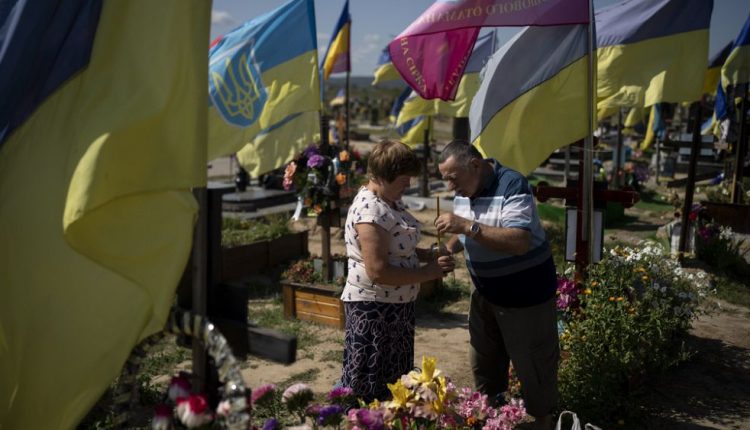Ukraine marked on Thursday its second Independence Day since Russia’s illegal invasion with families of fallen soldiers remembering their loved ones and the government vowing to keep up the fight to drive out the Kremlin’s forces.
The national holiday coincided with the war’s 18-month milestone and the ongoing fighting that overshadowed the commemorations, which took place in a sombre atmosphere.
“We remember everyone who gave their lives for freedom and independence, for the free future of Ukraine,” Ukraine President Volodymyr Zelenskyy said in a social media post.
He said that an independent Ukraine is “what we are fighting for.”
There were also messages of support on social media from many others, including the President of the European Commission, Ursula von der Leyen, and NATO, as well as numerous world leaders.
The EU’s foreign policy chief, Josep Borrell, said Ukraine was fighting for freedom, independence and territorial integrity, “the values we all stand for.”
The main message to Moscow and Vladimir Putin was a determination to drive Russian forces out of Ukrainian territory.
But achieving this is coming at a hefty price for the people of the embattled nation.
In the northeastern Kharkiv region, families visited a cemetery where fallen Ukrainian soldiers are buried.
Kateryna Krotchenko, the mother of Serhii Krotchenko, who was killed near Bakhmut, cleaned his grave.
“He was an ordinary boy who loved life and dreamed of something,” she told The Associated Press.
“Therefore, he did not accept the fact that war had come to our land and decided to (sign up) voluntarily,” she said. “We agreed with his decision. We didn’t think it would be like this.”
Ukraine’s struggle has earned the support of foreign allies, especially NATO alliance member countries that have provided Kyiv with sophisticated new weaponry.
Those new weapons have allowed Ukraine to launch a grinding counter-offensive, but military experts have warned that progress is likely to be slow.
The two months of the Ukrainian counter-offensive have not led to significant progress in recovering the territory, and according to one analyst, the EU is partly to blame.
“Why do we spend so much time diverging, taking so long to make decisions that could be made much quicker, as in delivering arms that Ukraine needs on the field, for example, the F16 (jets)?” asked Amanda Paul, Policy Analyst at the European Policy Centre. “Why is it taking one and a half years for Ukraine to get the green light? The pilots still need to be trained. This war will be over much quicker if Ukraine gets what it needs.”
But European solidarity with Ukraine remains strong.
The President of the European Council, Charles Michel, said the EU has spent €76 billion in support for the country, and that the bloc is preparing another financial package worth €50 billion.
Vsevolod Chentsov, the current head of the Mission of Ukraine to the European Union spoke of his appreciation for international support in his country’s struggle:
“Our allies understood what kind of danger Russia represents, what kind of challenge… not only for Ukraine but also to the European Union and the all civilized world… that Russia poses. So, it is our common battle, that is why I am sure this support will remain and increase.”
Read the full article here

